Synopsis
Spirited Away (2001) is a coming-of-age story that centers on the ten-year-old Chihiro. After her parents were turned into pigs upon eating food meant for the spirits, Chihiro embarks on a grueling quest in the spirit world to save them.
Analysis

Spirited Away (2001) is filled with so many themes that are relevant even today. In this post, we will focus on five major themes of this animation.
On Greed and Overconsumption
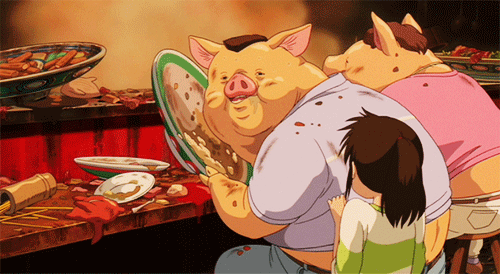
This is the first lesson we learn from this animation. Chihiro’s parents were turned into pigs because of their greed and lack of self-control. When Chihiro cautioned her parents and pleaded with them to leave the food, her father responds:
‘Dont worry. You got Daddy here. He’s got credit cards and cash…’
This is the common mentality today. We take what doesn’t belong to us, destroy things, and think throwing money at it makes it better. While this deification of money and blatant disregard for sacred things may not turn us into pigs like it did Chihiro’s parents, it makes us just as soulless.
Pigs are a critical symbol of consumption and capitalistic culture. Miyazaki inserts porcine images at different scenes in the animation to drive home a point. The bathhouse structure, for example, is shaped like a pig constantly gobbling resources to give gas to cater to its wealthy customers. The rich are gods and the activity of the bathhouse revolves around them. However, despite the resources consumed to make them happy the rich still aren’t happy. The entity ‘no face’ is a perfect example of how overconsumption brings sickness instead of fulfillment. On the other hand, Yubaba, the patroness of the bathhouse shows how wealth can isolate you and trigger high-functioning anxiety.
The Importance of Names
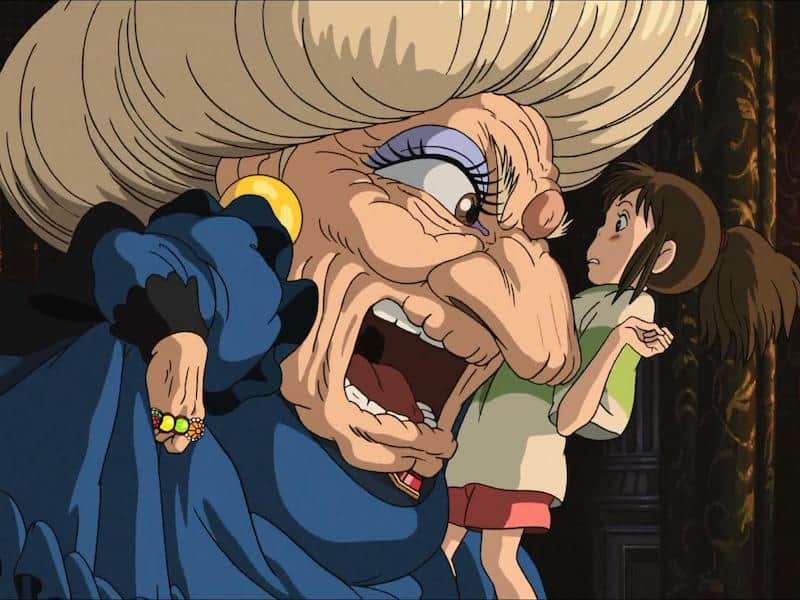
The Kanji (Japanese Alphabets) composing each character’s name in Spirited Away (2001) gives hints into their identities
E.g Yubaba literally means bathhouse witch,
Konachi means faceless/no face
Kamaji means Old Boiler Man
Before Yubaba ratifies any employee’s contracts, she first takes their names and gives them new ones. In doing this, she robs them of their identity and uniqueness and makes them ordinary. Chihiro means ‘A thousand searches’ or ‘A thousand fathoms’. Yubaba, took away a part of her name and left her with the name Sen which means ‘A thousand’. Chihiro was essentially reduced from a unique person whose personality was ‘a thousand fathoms’ deep to just a number.
Haku impresses upon her the importance of remembering her name. ‘If you completely forget it,’ he says ‘you’ll never find your way home.’ While names represent identity, in the 21st-century context, taking someone’s identity could be as simple as denying them the opportunity of self-expression or giving them tasks where their creativity is stifled.
The Corruption of The Spiritual by the Physical
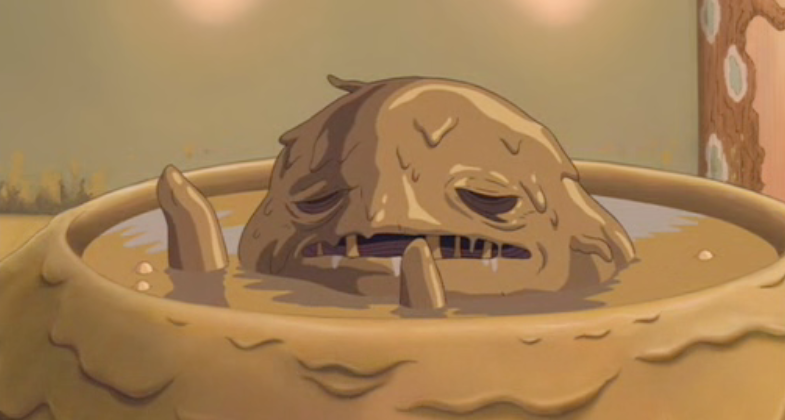
Excretion is the endpoint of the consumption process—and when you over-consume, it is only natural that you over-excrete. This excessive excretion leads to the contamination of the physical and metaphysical world around us. The spirits are corrupted by the waste of mankind. This is clearly seen in the case of the river spirit. When he came into the onsen, he was so filthy, that everyone thought he was a stink spirit. During his soaking and detoxification, different industrial and human wastes were pulled out of him—including a bicycle! Miyazaki said this scene was inspired by something that happened when he and his friends cleaned out a river
After the cleaning, the river spirit went back to his initial glory. The human junk was what poisoned his essence. This same dual phenomenon of overconsumption and contamination is the reason Haku cannot remember his identity. They destroyed his own river to build apartments.
Toxicity of Hustle Culture

‘If you don’t get a job, Yubaba will turn you into an animal.’
This, to me, was the scariest part of the movie. Chihiro had to save her parents before they were killed and roasted for dinner. But to do that she had to stay in the spirit world. The only way to remain relevant there was to get a job.
Spirited Away (2001) is an allegory about a country’s toxic obsession with work. Around the time this animation was created, Japan experienced an economic boom. This meant there were more jobs available to people and more hours to be worked. People worked so much that they barely had time for other facets of their life.
Today, hustle culture is still a thing. You are expected to have a full-time job, a side-hustle, and other streams of income because…well, eggs don’t do well in one basket. These days, people wear sleep deprivation like a badge of honor and assert dominance with the number of 80-hour weeks they have done in the past quarter. It kind of reminds me of this Elon Musk interview:
The truth is that no matter how many hours you put in or how high you rise, you are dispensable. We see it in the way Kamaji shouts ‘Move it you filthy shitballs’ to his hardworking underlings and also in the symbolic rebaptism of Chihiro to the replaceable, KPI-chasing statistic called Sen. That is how work steals your time and identity.
Chihiro’s survival depended on her productivity. Haku had already struck a bargain with the spirits in the bathhouse:
‘If she doesn’t work hard, roast her, boil her, do whatever you want.’
And that is the way it is for most of us. If we don’t work hard, hunger roasts us, bills boil us and poverty will do with us whatever it will. Just like Chihiro was working to get her life of comfort back, most of us are working towards a comfort we only see in our dreams. However, we all have agency and can determine how much of ourselves we want to sacrifice at the shrine of work. For Chihiro, it is in abandoning her hustle, going to save her friend, and holding on to something unquantifiable that she finds freedom.
On Postponing Happiness
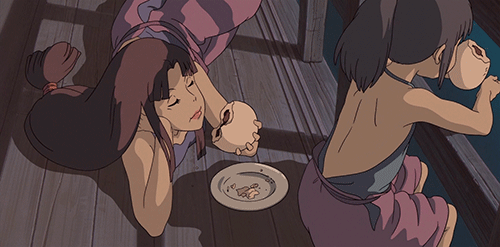
We all have things we look forward to.
Travel locations bookmarked on our Instagram
Post-it notes with events pinned to our mirrors
That road trip you and your friend group plan to do when you make more money/get a better job
For Lin, it is getting on the spirit train and getting away from all the drudgery of the bathhouse. For her, this dream was like the carrot before the proverbial donkey. The hope that she’d one day be able to afford a ticket and get on that train kept pushing her. But even when she did get some money, she kept postponing getting that ticket.
Hustle culture sells you a dream. You believe if you work x hours for x pay, then in x years, you’d finally be able to have the life you’d dreamed of. But the truth is you just may expire before then or be too old and worn out to enjoy those things when they come. To quote Hayao Miyazaki, ‘Children understand intuitively that the world they’ve been born into is not a blessed world.’ So they make the best of their present. Chihiro, unlike Lin, knew she had to leave and just left. Even when Chihiro’s journey ended, Lin was still there, with her name next to a shift.
Verdict
It is very difficult to make a movie that is entertaining, didactic, and relevant across different times and realities. Somehow, Spirited Away (2001) fulfilled all these. It is a 10 out of 10 and an unforgettable watch.
Like what you read? Check out The Electricity of Life: Review of The Electrical Life of Louis Wain (2021) or The Sunk Cost Fallacy: Why We Stay in Uncomfortable Situations.




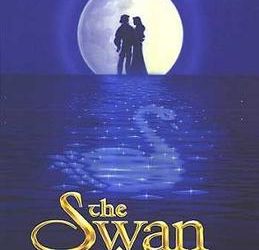
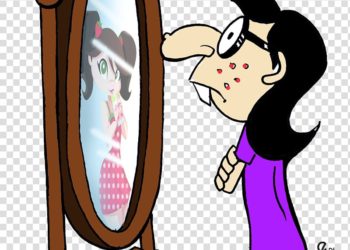


Comments 1